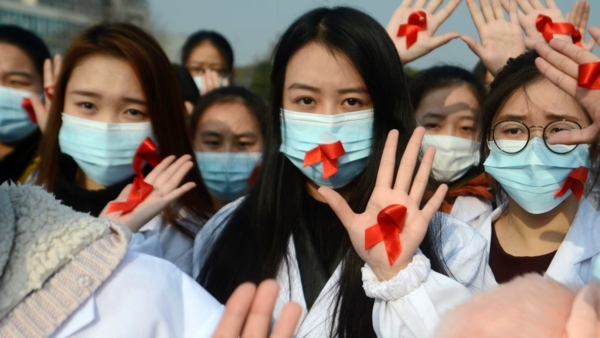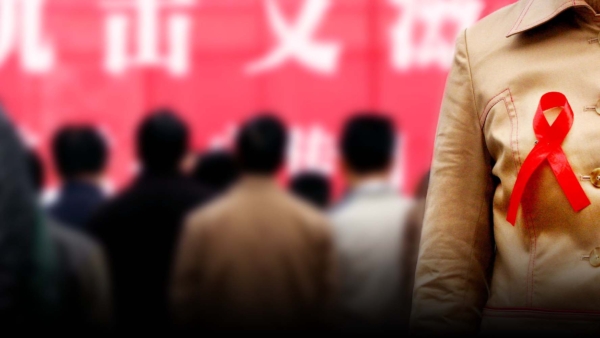Overview
China’s legal system includes national, provincial and local laws and regulations, which can be used for the criminalisation of HIV transmission, ‘exposure’, and non-disclosure. Access to information on relevant laws can be limited, making it challenging to accurately outline HIV criminalisation in China. Below is an overview of the laws and cases we are aware of.
Article 38 of the national Regulations on AIDS Prevention and Treatment outlines a list of obligations on people living with HIV, which includes an obligation to disclose HIV status to partners, inform medical providers, and take necessary measures to prevent HIV transmission. Article 62 states that failure to follow this obligations results in civil liability, and may be investigated for criminal responsibility if it believed a crime has taken place, although the applicable law is not specified.
Sex work by people living with STIs, which includes HIV, is specifically criminalised. Article 360 of the Criminal Law states it is an offence for any person who knows they have a ‘serious venereal disease’ to undertake sex work or engage the services of a sex worker. The penalty applied is imprisonment of not more than five years and a fine, and criminal detention or public surveillance.
While Article 360 uses the examples of syphilis and gonorrhoea and does not mention HIV, criminal prosecution guidance issued in 2017 confirms that the law applies to people living with HIV. The Interpretation by the Supreme People’s Court and the Supreme People’s Procuratorate of Several Issues Concerning the Application of Law to the Handling of Criminal Cases of Organising, Forcing, Inducing, Accommodating or Introducing Prostitution, explicitly outlines under Article 12 that Article 360 applies in cases of sex work by people living with HIV, and does not require transmission to take place.
Furthermore, this guidance also states that Article 95(3) of the Criminal Law is applied in cases of HIV ‘exposure’ through sex work, but also generally in any case where someone knowingly living with HIV has sexual relations without using preventative measures. This appears to apply the law of ‘serious injury’ to any instance of alleged HIV ‘exposure’ through sex. The penalty is that stipulated under Article 234(2), of three to ten years’ imprisonment, enhanced in the case of death or ‘utter disability’.
In December 2024, the government released a new federal plan for tacking HIV/AIDS, ‘China’s Plan for the Prevention and Control of AIDS (2024-2030)‘. Section VI of this plan reaffirms that the state will ‘crack down on and deal with dangerous behaviours involving the spread of AIDS in accordance with the law, and promptly file a case for investigation in accordance with the law for suspected intentional spread of AIDS.’
Provinces and municipalities can also issue their own laws and policies concerning HIV. For instance:
- In 2009, Gansu province in north-western China passed a law mandating that anyone newly diagnosed must disclose their HIV-positive status to sexual partners within a month of diagnosis, and encourage them to receive counselling and testing. Non-disclosure may result in prosecution for ‘deliberate; HIV transmission, although the penalties are not clear.
- In 2020, it was reported that Yunnan province was considering a new law which would criminalise non-disclosure of HIV status to partners, and enable medical professionals to disclose their status.
- In 2024, it was reported that the municipality of Chongqing would revise its laws concerning HIV/STI control to target sexual transmission. The municipal health commission has convened to discuss revisions to the law, and has undertaken research into HIV prevention in the city. The review will result in a “crackdown” on those suspected of transmitting HIV sexually, and those living with HIV who engage in prostitution, solicitation, or drug use. However no concrete proposals were reported.
HIV Justice Network is aware of only four cases from China, although this is likely because media written in Chinese does not routinely appear in our media scanning. The first known case was identified in an academic article on phylogenetic analysis which investigated the possibility of HIV transmission from a man to a woman through unprotected sexual contact.
A more recent case involves an HIV-positive man who bit an officer attempting to carry out a forced eviction. The man was initially detained for 15 days, however his sentence was extended to a year because he was HIV-positive. HIV was not transmitted. The media report is particularly concerning as it wrongly states that HIV has an ‘incubation period’ of up to 20 years. It is unclear whether that is information the court relied on or whether it is an error by the reporter. The reporter also notes that if the bitten officer becomes HIV positive, the accused could be tried for deliberately infecting someone with HIV, suggesting such cases are not unknown.
In 2022, a woman living with HIV in Changsa, Hunan Province, was prosecuted for allegedly doing sex work without using protection. It is not clear if HIV was transmitted. She was sentenced to a fine and one year and four months’ imprisonment. It is not clear under which provision she was charged.
A further case reported in 2024 concerned a woman living with HIV who allegedly worked as a sex worker without disclosing his HIV status. She was convicted under Article 360 of the Criminal Law, and sentenced to imprisonment (the sentence was not reported) and a fine. The media report suggests this is the first case of HIV criminalisation under this law.
Laws
Decree of the State Council of the People’s Republic of China No. 457 of 2006
Regulations on AIDS Prevention and Treatment
Article 38:
People with HIV and AIDS patients shall perform the following obligations:
(1) Accept epidemiological investigation and direction of agencies of diseases control and prevention or inspection/quarantine;
(2) Inform the fact of being infected or suffering the disease to their sexual partner in time;
(3) Inform the fact of being infected or suffering the disease to their medical doctor when they come to see the doctor;
(4) Take necessary precaution measures to prevent others being infected.
People with HIV positive and AIDS patient shall not, on purpose, spread the infection to others by any means.
Article 62
HIV positive or AIDS patients (sic) who on purpose spread AIDS shall have the legal liability for compensation in accordance with the civil law, and if a crime is constituted/established/committed, an investigation shall be carried out for criminal liability in accordance with the law.
Criminal Law of the People’s Republic of China 1997
Article 95.
Serious injuries as mentioned in this Law refers to any of the following:
(…)
(3) other injuries that cause grave harm to a person’s physical health.
Article 234.
(…)
(2) Whoever commits the crime mentioned in the preceding paragraph, thus causing severe injury to another person, shall be sentenced to fixed-term imprisonment of not less than three years but not more than 10 years; if he causes death to the person or, by resorting to especially cruel means, causes severe injury to the person, reducing the person to utter disability, he shall be sentenced to fixed-term imprisonment of not less than 10 years, life imprisonment or death, except as otherwise specifically provided in this Law.
Criminal Law of the People’s Republic of China 1997
Article 360.
Any person who knows clearly that he or she is suffering from serious venereal diseases such as syphilis and gonorrhea goes whoring (sic) or engages in prostitution shall be sentenced to fixed-term imprisonment of not more than five years, criminal detention or public surveillance and shall also be fined.
Further resources
This report is the culmination of 18 months of work undertaken with multiple stakeholders in China. It documents the current legal, regulatory and policy
environment impacting on access to HIV services by PLHIV and key populations. The review and consultation process was supported by UNDP and UNAIDS together with the UN ESCAP Secretariat.
Prosecutorial guidance concerning the application of the criminal law to sex work, which outlines under Article 12 that sex work by people living with HIV is prosecutable under Article 360 of the Criminal Law. It further states that any sexual intercourse by someone living with HIV without preventative measures is prosecutable under Article 234(2) of the Criminal Law.
Acknowledgements
Our thanks to Australian law firm Hall & Wilcox for their research assistance to confirm current relevant legislation.
HIV Justice Network's Positive Destinations
Visit the China page on Positive Destinations for information on regulations that restrict entry, stay, and residency based on HIV-positive status, as well as access to HIV treatment for non-nationals.








